Will the eurozone become an European “Super League”?
Ralitsa Kovacheva, June 11, 2010
 An idea that has been hovering above the European football for years - the richest and most successful clubs to unite in a so-called " Super League”, which would obviously receive the lion's share of revenues from advertising and TV rights. The idea, of course, is controversial and is meeting resistance from the 'second echelon' clubs.
An idea that has been hovering above the European football for years - the richest and most successful clubs to unite in a so-called " Super League”, which would obviously receive the lion's share of revenues from advertising and TV rights. The idea, of course, is controversial and is meeting resistance from the 'second echelon' clubs.
Similar idea is now inciting the spirits in the European Union - the euro area to have a separate, permanent economic governance, which to be able to take common decisions in a faster and more organized manner. The proposal, as you may guess, belongs to France and in a typical French style includes the institutionalization of such a governance - with a president of its own and a secretariat.
A favourite to head the "economic governance" of the euro area is the President 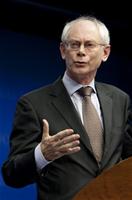 of the EU Council Herman van Rompuy. As it became clear, the Belgian is not a stranger to the idea and has claimed leadership by heading two important meetings of Eurogroup leaders. The regular meetings of the finance ministers of the 16 (on the eve of the Ecofin) are usually chaired by the Prime Minister of Luxembourg Jean-Claude Juncker.
of the EU Council Herman van Rompuy. As it became clear, the Belgian is not a stranger to the idea and has claimed leadership by heading two important meetings of Eurogroup leaders. The regular meetings of the finance ministers of the 16 (on the eve of the Ecofin) are usually chaired by the Prime Minister of Luxembourg Jean-Claude Juncker.
According to European diplomats, Van Rompuy himself does not believe that the establishment of a separate governance of the euro area should be formalized as a new institution with a separate secretariat - instead it could use the administration of the Council of the EU, led by Van Rompuy. So far, the French proposal for a new European institution has met the skepticism of Germany, which fears that such a decision could affect the independence of the European Central Bank and lead to state intervention in market economy.
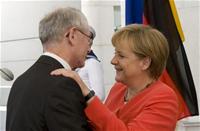 The big question, however, is basic: should the eurozone countries take decisions separately from the other 11 Member States, no matter that they share a common currency? In a statement after his meeting with German Chancellor Angela Merkel on June 10, President Van Rompuy said:
The big question, however, is basic: should the eurozone countries take decisions separately from the other 11 Member States, no matter that they share a common currency? In a statement after his meeting with German Chancellor Angela Merkel on June 10, President Van Rompuy said:
“Euro area-members share the same currency which in some cases implies a higher level of economic coordination. However, the non-euro countries are economically and financially closely linked to the Eurozone. Most of these countries are obliged to join the euro once they fulfill the criteria. We do not need new institutions to meet our goals. We need more effectiveness.”
Poland strongly opposed the 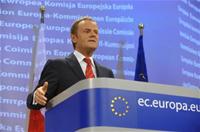 separation of the euro area in the elite part of the EU: "As a country that is aspiring to join the eurozone, we would like the eurozone to be a leader but not an exclusive elite within the European Union", Polish Prime Minister Donald Tusk told in Brussels. According to him, this could lead to a two-speed Europe: "It's very important that the European Commission stands up for equal standards for all EU member states. We want a united Europe that can take actions in solidarity for the benefit of the EU as a whole."
separation of the euro area in the elite part of the EU: "As a country that is aspiring to join the eurozone, we would like the eurozone to be a leader but not an exclusive elite within the European Union", Polish Prime Minister Donald Tusk told in Brussels. According to him, this could lead to a two-speed Europe: "It's very important that the European Commission stands up for equal standards for all EU member states. We want a united Europe that can take actions in solidarity for the benefit of the EU as a whole."
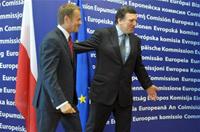 This position is fully shared by the President of the European Commission Jose Manuel Barroso : "The general framework should be the same for the eurozone as for the non-eurozone countries. We can't have a split in the EU" .
This position is fully shared by the President of the European Commission Jose Manuel Barroso : "The general framework should be the same for the eurozone as for the non-eurozone countries. We can't have a split in the EU" .
Recent Commission's proposals to strengthen financial discipline and supervision and for greater coordination of economic policies of Member States are exactly in this style, with common rules for all member countries, but with tighter control, particularly on competitiveness in the euro area. In the same spirit are also the first decisions of the Task-force, led by EU President Herman Van Rompuy.
Unstable market positions of the euro and the fear about the future of the eurozone, however, may pour water in the mill of supporters of the idea of a "Super-Euro-league”. Therefore, the other countries (except, of course, for Great Britain, which firmly refused to be treated as eurozone countries) should follow the example of Poland and clearly state a position in support of common rules and common governance in the entire EU. Because all of them would like to become members of the eurozone as well and will have to work on their standards in order to be ready. Leaving the non-euro area countries in the periphery of Brussels' attention is the last of what the EU needs if it really wants to emerge from the crisis more cohesive and united.
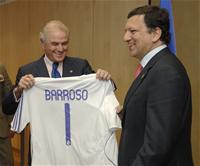 And if we go back to football, imagine how the best teams in Europe separate themselves in a championship of their own. Unfortunately, the analogy with the euro area is not literal, because not all 16 countries have first-class clubs and because the English teams are out of the account. But if we disregard the details, the metaphor is this: If we imagine that the euro area could become like a football “Super League”, when do you think the Bulgarian teams of “Levski” or CSKA will join?
And if we go back to football, imagine how the best teams in Europe separate themselves in a championship of their own. Unfortunately, the analogy with the euro area is not literal, because not all 16 countries have first-class clubs and because the English teams are out of the account. But if we disregard the details, the metaphor is this: If we imagine that the euro area could become like a football “Super League”, when do you think the Bulgarian teams of “Levski” or CSKA will join?